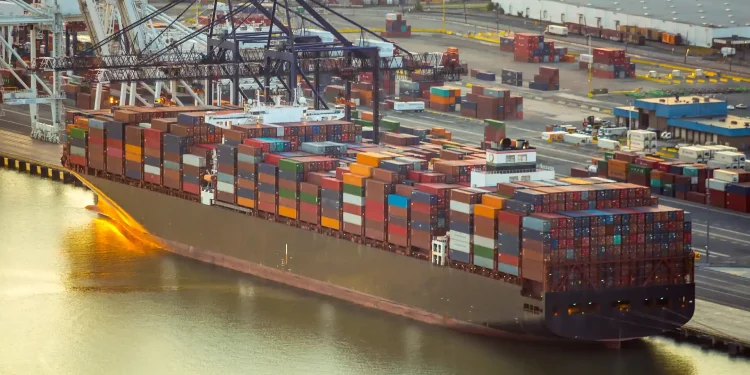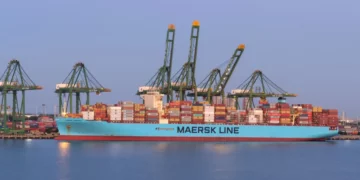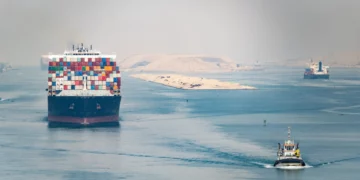In a development with far-reaching economic implications, major shipping companies have made the unprecedented move of suspending their vessels’ passage through the Red Sea. This decision, prompted by increasing attacks from Houthi militants in Yemen, has raised fears about increased insurance costs and longer travel times – at a time when the global economy is already faltering.
Mediterranean Shipping Company, OOCL, Hapag-Lloyd, and CMA CGM have joined industry leader Maersk in avoiding the Red Sea maritime corridor. With these shipping behemoths collectively controlling a lion’s portion of the global shipping market, the suspension disrupts the flow of goods between Asia and Europe, impacting supply chains and increasing transport costs.
The Red Sea’s Role in International Trade
The Red Sea serves as a crucial artery for global seaborne trade, including oil, minerals, grain, and various consumer goods. More than 12% of global trade passes through the Red Sea, connecting Europe and Asia. The current disruptions thus have deep implications for European trade and the global oil supply chain – both of which were already not doing so well before this.
Israel’s heavy reliance on maritime trade, with 99% of its goods imported by sea, amplifies the challenges posed by the disruptions. Importers face uncertainties, increased stockpile requirements, and higher costs, affecting the competitive time-to-market for goods.
The economic fallout extends far beyond Israel. The decision to bypass the Suez Canal impacts most other countries in the region, particularly Egypt, which heavily relies on canal fees amounting to $12 billion annually – at a time when its economy is already struggling. The disruption in trade routes has prompted speculation about the inflationary impact on consumer goods, as this shift is expected to increase shipping costs by up to $1 million per vessel, a rise of 40%.
Impact on the Oil Market
The strategic importance of the Bab el-Mandeb Strait, a narrow channel only 29 km wide, which connects the Red Sea and the Indian Ocean, cannot be overstated, as it sees 10% of the world’s seaborne crude flows. While the Houthi actions have had a “fairly limited” impact on the oil market for now, there is growing concern about the escalation of these attacks and their repercussions.
Colby Connelly, a senior analyst at Energy Intelligence, noted that crude prices have seen a sharp uptick as the attacks persist, with markets taking increasing notice of the situation. The uncertainty surrounding the crisis and the continuous attacks contribute to a “war premium” on insurance and oil products.
The possibility of a more extensive disruption, such as the full closure of the Bab el-Mandeb Strait, would lead to a complete renegotiation of cargo contracts, affecting oil and liquefied natural gas (LNG) prices and exerting upward pressure on them. The last time shipping lanes were impacted so drastically was back in the ’80s, during the so-called ‘Shipping War’. However, the possibility of a full strait closure seems unlikely, given that the Houthis lack advanced naval equipment.
International Response and Potential Intervention
Shipping companies are urging the international community, including the US and European allies, to address the situation through a multinational task force for protecting ships in the region. The International Chamber of Shipping has condemned the Houthi attacks as a “flagrant breach of international law” and called for strict actions to ensure maritime security.
Most global players, including China, India, the Gulf Cooperation Council states, Iran, and Western powers, have a vested interest in maintaining the stability of trade routes, particularly those crucial for oil transportation. China and Iran, cognizant of the negative economic impacts, may exert pressure on the Houthis to curtail their hostile activities.
The United States is set to unveil an expanded maritime protection force named Operation Prosperity Guardian in collaboration with Arab states. This initiative aims to counter the growing frequency of attacks on commercial shipping in the Red Sea. Defense Secretary Lloyd Austin is expected to announce the operation during his Middle East visit.
Additionally, major powers with military bases in the region, which include the UK, Germany, Spain, Italy, France, Saudi Arabia, and Japan, might increase their patrols to stop the raids. As the economic stakes steadily rise, the international community faces the challenge of safeguarding these vital routes and ensuring freedom and security of navigation in the Red Sea. The situation has clearly shown the need for coordinated efforts between nations to protect maritime lanes and preserve the integrity of global trade routes.

















